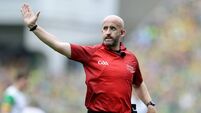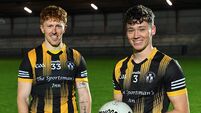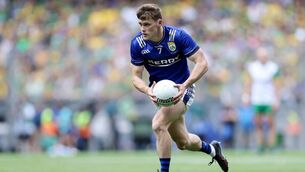Sure look, if nothing else, the football shortens the winter, doesn’t it?
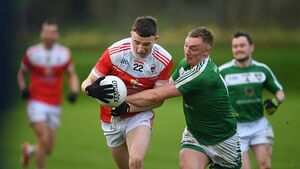
Pádraig Pearses’ Seán Canning brushing off the close attentions of Mohill's Keith Keegan during the Connacht SFC club semi-final in Ballinamore on Sunday. Pict: Gerard
The people of Pádraig Pearses and Elphin will certainly be feeling that this year, along with the many more Rossie supporters who are rowing in behind them on the provincial stage.
Pearses’ win ensures we’ll have an interest into December, and I wouldn’t bet against either side going further.
A team in both the senior and intermediate provincial club finals is a further sign of the healthy state of football in the county. I’ll look at both teams’ performances here now.
PEARSES: For a change, it won’t be Niall getting the extra scoop of spuds in the Daly household this week. On a day when Pearses needed somebody to grab the game by the scruff of the neck, it was Ronan who stepped forward. Up until his quick two point salvo about 20minutes in, this game was very tight with little or nothing in the way of line-breaks or overlaps being created.
Ronan's got to be up there in the man of the match conversation, particularly because his big plays mostly came at crucial junctures in the game.
Two more of the usual suspects are in that conversation as well. Paul Carey, once again, looked really good. As this campaign wears on he’s showing more and more leadership. On Sunday, he actually got on very little ball inside but rather it was his defensive work, tracking back to force some serious turnovers, which stood out.
Can you guess the third player on my list of top performers from Sunday for Pearses? Declan Kenny just doesn’t seem to do bad performances. His speed caused Mohill all sorts of problems, more so as the game progressed, and definitely after they were reduced to 14 men.
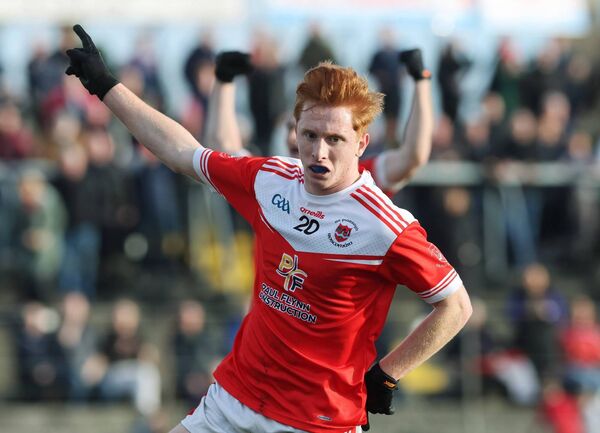
One interesting thing to look at, tactically, was both teams’ attacking approaches. Each side were happy to get a lot of men behind the ball. Mohill often had 15 inside their own half. Slippy conditions, and a lot of conservative play, meant teams struggled to transition quickly and so most attacks were of the slow, ponderous variety.
Pearses are masters at this even though they were far from at their best especially in the first half. What was interesting was the difference in the way both teams attempted to break down the mass defence.
Mohill were straightforward enough. Two or three lads inside and they’d try to create an overlap outside through quick one-twos, or occasionally try the chip pass inside. They have some fine footballers individually, but they didn’t have anything near the level of athleticism required to stretch Pearses at all as evidenced by their final tally of just three points.
Pearses, though! Pearses were much more inventive. I wonder what’s the record for most fellas in the full-forward line at once. They regularly committed five or six lads inside the Mohill 20 metre line, and at one stage in the second half I even counted seven. This gave them more space around the half-forward line and, once they found their mojo, they made hay, particularly through the likes of Ronan Daly and Declan Kenny.
We’re unlikely to ever see a programme with Niall Carty, Davy Murray and Conor Ryan listed together in the full-forward line but that’s where they went on a lot of the Pearses attacks.
As we so often hear, a sign of a top team is that they can win playing poorly. That could be said about Pearses on Sunday. I came away even more impressed by them. They will rightly head into the Connacht Final as strong favourites.
Another road trip awaits the red and white bandwagon. Get out the flasks and sandwiches again. I dare say at this stage they nearly prefer to be away from home on their adventures.
ELPHIN: Even more so than Pearses, Elphin got the job done without playing well.
In many ways it was a poor game, although it was enthralling. As it wore on, Elphin got over the finish line simply by being the team who made the fewest mistakes.
Early on, I actually felt like they would win with a bit to spare. They looked sharp and on top all over the field. But something changed. It’s hard to tell what it was.
Eastern Harps, to be fair to them, improved. But I think it was more a case of Elphin falling into a mindset that they would coast to victory. Once you’re in that frame of mind, it can be very hard to come out of it.
Matt Henry and Caelan Hunt in the full forward line for Harps caused Elphin all sorts of bother, and in fact they’ll be disappointed they didn’t capitalise more on their dominiance in the second quarter.
On a day he got plenty of close attention, Shane Killoran still managed to deliver some big moments for Elphin when they needed it. Shane Beirne was probably their best player, making a couple of score-saving interventions in the first half before going back in to marshall Henry in the second half.
Aaron Brady could also lay claim to being Elphin’s most important player on the day. His expertly struck 45s were crucial in a low-scoring encounter and, as always, he exuded confidence in an otherwise shaky looking team.
John Finnerty, after his superb county final performance off the bench, played the full game and did well in patches. He shows glimpses of really good stuff but needs to get on the ball and affect the game more often.
I’d imagine Nigel Dineen will come away relieved that they squeezed over the line. He’ll know they’ll need a much bigger performance to get a result in the final against Crossmolina.
I reckon being the underdogs and feeling like they’re up against it will suit them though. They need to get back to the level of their county final win over Strokestown, where they defended deep and tigerishly, and then attacked on the break with a ruthless and punchy streak.
If they can do that, then they have every chance.
